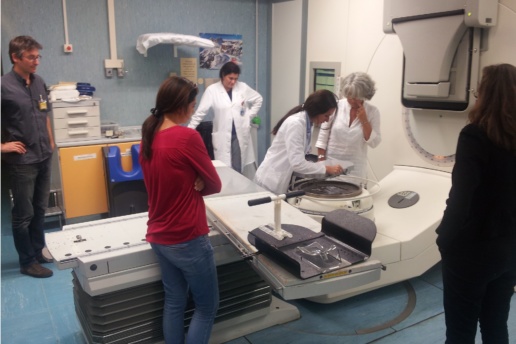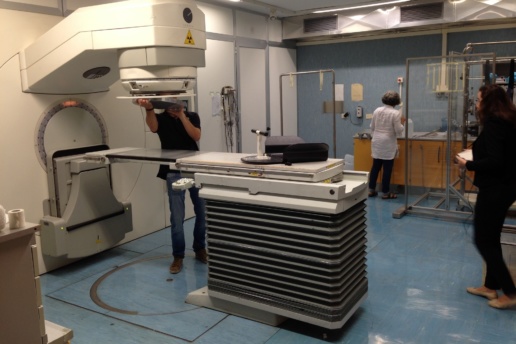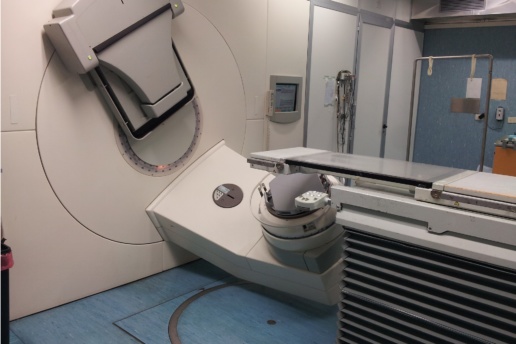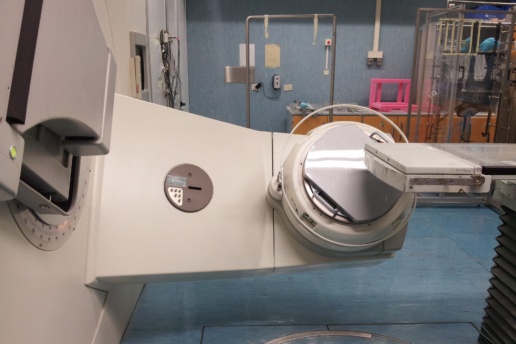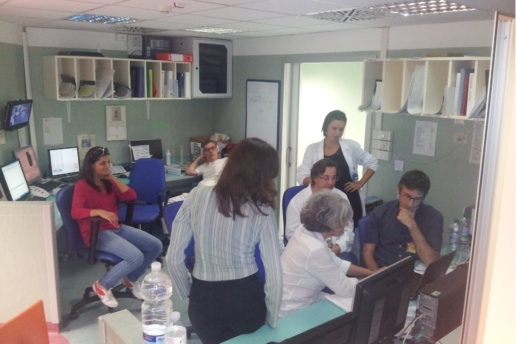Azienda Ospedaliero Universitaria Careggi, Florence
Azienda Ospedaliero Universitaria Careggi is the major hospital of Florence (Italy) and also a teaching hospital.
The Radiotherapy department team consists of 17 radiotherapists and 7 medical physicists.
The Radiotherapy department treats over 2000 patients per year with external beams, using different techniques like Image Guided Radiotherapy (IGRT), 3D Conformal Radiotherapy, Intensity modulated Radiotherapy (IMRT), Volumetric Arc Therapy (VMAT) Stereotactic Radiosurgery / Radiotherapy (SRS/T), Adaptive Radiotherapy, and respiratory gated treatments (Active Breathing Control).
Careggi Hospital also performs Total Body Irradiation (TBI), Total Skin Irradiation, Radiotherapy treatments for solid or hematoligic tumors in pediatric patients both with and without sedation. It delivers Curietherapy treatments with Brachytherapy, I-131 metabolic treatments, radioimmunotherapy, and endocavitary Radiotherapy.
The Radiotherapy department at Careggi Hospital performs health care services and consultancy for other hospitals in the area, as well as research and educational work.
AddressLargo Brambilla 3City50134 Firenze, ItaliaMain ContactDr. Stefania PallottaEmailinfo@i-rt.de for detailsPhoneinfo@i-rt.de for detailsWebpagewww.aou-careggi.toscana.itLinac5 (3x Elekta, 1 Elekta Gammaknife, 1 Tomotherapy)TPSPhilips PinnacleIQM tested onElekta Precise MLCiIQM related publications This multi-center study by Livia Marazzo, published in the German Journal of Radiation Therapy and Oncology tests the sensitivity of the Integral Quality Monitor (IQM) transmission detector for online dose monitoring of IMRT treatment techniques to detect small delivery errors. The article furthermore investigated the correlation between changes in the IQM signal, induced by small delivery errors, with other metrics like Gamma passing rate and dose-volume histogram metrics. Download this article to learn about the high sensitivity of the IQM transmission detector for small delivery errors as well as the good correlation between the IQM detector signal and DVH metrics. This article discusses the influence of the Integral Quality Monitor (IQM) transmission detector on photon beam properties. The authors evaluated data acquired at nine different Radiation Therapy centers and concluded that the magnitudes of changes observed justify treating IQM either as energy-specific tray factors in the treatment planning system or alternatively as a set of modified output factors for each linac energy. Download this article for some valuable guidance for implementing the IQM System into your clinical routine. Cinzia Talamonti and her colleagues from the University of Florence, Italy verified the delivery of the prescribed dose during radiotherapy treatment using the IQM in combination with portal imaging, together with the software SoftDiso (Best Medical Italy Srl) for in-vivo measurements. They evaluated the ability of detecting positional and delivery errors intentionally introduced during breast treatments. Download the full poster that was shown during the AIFM Conference in Perugia, Italy in February 2016. Stefania Pallotta states that IQM provides an optimal performance for IMRT QA, based on the results of this study, which saw intra-fractional standard deviation (%STD) of 0.04% and inter-fractional %STD of up to 0.36% for complex IMRT cases over a period of multiple weeks. Download the full presentation that was held at the iRT booth during the 3rd ESTRO Forum in Barcelona, Spain Stefania Pallotta from University of Florence, Italy evaluated the IQM during pre-clinical testing. She concludes that IQM provides optimal performance for signal reproducibility for complex IMRT plans. Her work demonstrated that IQM is capable of detecting small errors in MU and leaf positions and is sufficient for clinical practice. Download the complete poster that was shown at the IEEE conference in Milano, Italy Chiara Arilli, Cinzia Talamonti, Livia Marrazzo and their colleagues from the AOU Careggi, Florence, Italy evaluated the output signal reproducibility and sensitivity in detecting small errors in delivery parameters of step and shoot IMRT treatments with the IQM System. The team also assessed the correlation between IQM signal variations and 3Dγ, 2Dγ and DVH parameters. Download the full poster that was shown during the AIFM Conference in Perugia, Italy in February 2016. Livia Marrazzo and her colleagues at the AOU Careggi in Florence evaluated the correlation between changes in the detector output signal induced by small delivery errors with other metrics, such as the Gamma pass rate and DVH variations. They concluded that IQM is capable of detecting small delivery errors and that it exhibits a good correlation with other metrics currently used to determine the quality of a treatment plan. Download the full presentation that was shown during the ESTRO35 Conference in Turin, Italy in May 2016.
Real-time beam monitoring for error detection in IMRT plans and impact on dose-volume histograms
Influence of the Integral Quality Monitor transmission detector on high energy photon beams: A multi-centre study
Beam Delivery Check and In-Vivo Dosimetry during Breast Radiotherapy Treatment
Preliminary tests with the IQM system - the University of Florence experience
Testing IQM: A system for real-time monitoring of complex radiotherapy treatments
Reproducibility and sensitivity of IQM: A real-time monitoring device for complex radiotherapy treatments
Delivery errors detectability with IQM, a system for real-time monitoring of radiotherapy treatments
An intriguing device...
John Wong, Ph.D. Head of Radiation Oncology Physics, Johns Hopkins University, Baltimore, USA
"This allows everyone to stay ahead of the game of QA."
Stanley Benedict, Ph.D. Professor & Vice Chair of Clinical Physics, Department of Radiation Oncology, University of California at Davis Comprehensive Cancer Center, USA
"IQM constitutes a paradigm shift in treatment verification..."
David Jaffray, Ph.D. Head of Radiation Physics Department, Princess Margaret Cancer Centre, Toronto, Canada
"The best idea I have seen in years..."
Uwe Götz, Medical Physicist, St. Vincenz Krankenhaus, Limburg, Germany
"A physics tool for the independent verification of the final beam product."
Robert Heaton, Ph.D. Medical Physicist, University of Toronto, Canada
"Measuring with IQM is a piece of cake..."
Lan Lin Ph.D. Medical Physicist, Johns Hopkins Group, Washington, D.C., USA
"I see endless possibilities..."
Henk Huizenga, Ph.D. Head of Radiation Oncology Physics, Radboud University Nijmegen, The Netherlands
"The IQM System is a highly sensitive dose monitoring device.”
Stefania Pallotta, Department of Experimental and Clinical Biomedical Sciences “Mario Serio”, University of Florence, Florence, Italy
"IQM is an especially good candidate for monitoring small fields due to its unique detector design"
David Hoffman, Ph.D., Medical Physicist, University of California San Diego, USA
"Why didn't anybody think of this before?"
A sentence that we hear during almost every presentation.
"Our study demonstrates clinically negligible changesin beam quality and surface dose for all investigated beams.”
Bozidar Casar, Ph.D., Medical Physicist, Institute of Oncology Ljubljana, Slovenia
"The results of our study demonstrate the clear and consistent correlation of the IQM signal with DVH metrics.”
Livia Marrazzo, Medical Physic Unit, Careggi University Hospital, Florence, Italy
"IQM is a key component of our automated treatment quality control and allows us to fully comply with the requirements defined in the 2013/59/EURATOM directive."
Holger Wirtz, Lake Constance Radiation Oncology Center, Singen-Friedrichshafen, Germany
"The quick setup and fully automated handling of all clinical data significantly reduces the time we need for Plan QA. Our clinical evaluation has shown that the error detection capability of the IQM System is at least as good, and in many cases even better, than with conventional 3D phantoms."
Otto Sauer, Ph.D., Head of Medical Physics, University of Würzburg, Würzburg, Germany
